You’ll be forgiven if you’re a little behind on your “new year, new you” goals for 2021. After all, we’re still coming off one of the most unexpectedly volatile and uncertain years in recent memory. We all deserve to coast on the self-improvement front for a bit.
But if you’re ready to dig in, we have you covered with this list of books that will help you improve in valuable ways.
8 books to improve your leadership skills - and yourself
Want to become a lifelong learner? We’ve got a book of proven practices from a renowned brain coach. Struggling with bringing out the best in your people? Harvard Business School professor Frances Frei reveals the secrets to unlocking potential in others.
Maybe you’re tired of running into silos and walls and divisions that hinder progress – best-selling Never Eat Alone author has a new idea for you: “co-elevation.” Overwhelmed by your inbox? there’s a new treatise from Cal Newport on the true cost of email and how we might better communicate and collaborate in the future. And if you’re looking for a well-rounded compendium of remote work and management advice, we’ve got that, too.
Let’s delve into the books:
Limitless: Upgrade Your Brain, Learn Anything Faster, and Unlock Your Exceptional Life
By Jim Kwik
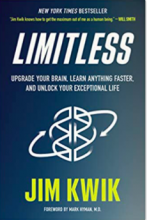
Book description (via Amazon): “Jim Kwik, the world’s #1 brain coach, has written the owner’s manual for mental expansion and brain fitness. Limitless gives people the ability to accomplish more – more productivity, more transformation, more personal success and business achievement – by changing their Mindset, Motivation, and Methods. These ‘3 M’s’ live in the pages of Limitless along with practical techniques that unlock the superpowers of your brain and change your habits.”
Why you should read it: Yes, the author’s name really is Kwik. And yes, he wants to help your brain work faster – and better. Your brain is a supercomputer, Kwik explains, and your thoughts are its programming. Thus, Kwik’s book begins with identifying the assumptions, habits, and procrastinations that may hold you back and shifting your mindset from negative thinking to positive possibilities. It teaches you how to identify what you want in every aspect of your life. His approach is inspired by neuroscientific research into accelerating learning – something we should all try to understand in an era of exponential and ongoing change.
[ Want more book advice? Read also: 10 leadership books to stretch your skills in 2021 and How to build strong teams: 8 must-read books. ]
Unleashed: The Unapologetic Leader’s Guide to Empowering Everyone Around You
By Frances Frei and Anne Morriss
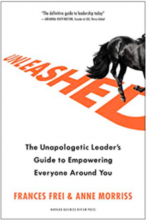
Book description (via Amazon): "Leadership isn’t easy. It takes grit, courage, and vision, among other things, that can be hard to come by on your toughest days. When leaders and aspiring leaders seek out advice, they’re often told to try harder. Dig deeper. Look in the mirror and own your natural-born strengths and fix any real or perceived career-limiting deficiencies.
Frances Frei and Anne Morriss offer a different worldview. They argue that this popular leadership advice glosses over the most important thing you do as a leader: build others up."
Why you should read it: It’s not all about you. While top-down, cult-of-personality type leadership may have dominated in the previous century, it’s becoming abundantly clear in the second decade of this one that unilateral and hierarchical approaches tend to underperform. Frei, Harvard Business School Professor of Technology and Operations Management whose 2018 TED talk How to build (and rebuild) trust has been viewed nearly 5 million times, explains that true leadership requires you to be present to the needs, abilities, and potential of other people – and to respond quickly and strategically to them. Written with co-author Anne Morriss, founder of the Leadership Consortium (TLC), this book shares anecdotes of how effective leaders create an environment in which others can excel.
Think Again: The Power of Knowing What You Don’t Know
By Adam Grant
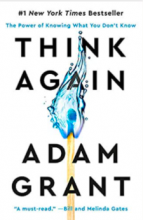
Book description (via Amazon): “Organizational psychologist Adam Grant is an expert on opening other people’s minds – and our own. As Wharton’s top-rated professor and the bestselling author of Originals and Give and Take, he makes it one of his guiding principles to argue like he’s right but listen like he’s wrong. With bold ideas and rigorous evidence, he investigates how we can embrace the joy of being wrong, bring nuance to charged conversations, and build the tools, workplaces, and communities of lifelong learners…If knowledge is power, knowing what we don’t know is wisdom.”
Why you should read it: Conviction is comfortable. Doubt causes distress. It’s no wonder that keeping an open mind or changing course is so difficult for humans. Yet, as the best-selling author explains, the critical art of rethinking – learning to question your opinions and open other people’s minds – is often what leads to success. Grant explains the value of learning to unlearn and outlines how to do it.
Leading Without Authority: How the New Power of Co-Elevation Can Break Down Silos, Transform Teams, and Reinvent Collaboration
By Keith Ferrazzi and Noel Weyrich
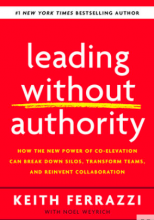
Book description (via KeithFerrazzi.com): “Ferrazzi redefines collaboration with a radical new workplace operating system in which leadership no longer demands an office, an official title, or even a physical workplace. In times of challenge, we have a choice: we can retreat further into our isolated silos, or we can commit to 'going higher together.' Through his prescriptive approach, Ferrazzi offers real-world solutions for creating exponential change in the world. Once mastered, the lessons of Leading Without Authority and Co-Elevation go well beyond the scope of business and the workplace.”
Why you should read it: Keith Ferrazzi is all about relational and collaborative success, previously writing two of the most recommended business bibles for relationship-building (Eat Alone and Who’s Got Your Back). In his third book, Ferrazzi argues we no longer have any time to waste navigating complex chains of command or bureaucratic bottlenecks; we must excel – and elevate our performance – together. He proposes a new workplace operating system in which offices, an official title, or even a physical workplace are replaced by deep, inclusive, and candid collaboration. Bonus: Ferrazzi’s website offers a bunch of freebies, including a video intro to the co-elevation concept, articles on timely issues like The Key to Managing Teams You Can’t See, and a virtual interview with Fast Company on How Your Remote Team Can Outrun a Virtual One.
HBR Guide to Remote Work
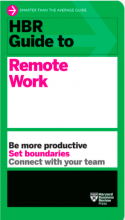
Book description (via HBR.org): “Get your best work done, no matter where you do it. Video calls from your couch. Project reports in a coffee shop. Presentations at your kitchen table. Working remotely gives you more flexibility in how and where you do your job. But being part of a far-flung team can be challenging. How can you make remote work work for you? The HBR Guide to Remote Work provides practical tips and advice to help you stay productive, avoid distractions, and collaborate with your team, despite the distance that separates you.”
Why you should read it: Hot off the digital press, this 240-page eBook brings together the best, most recent advice for thriving in the remote work world. It offers how-to tips on creating a real WFH routine, picking the best tech tools, preventing burnout, managing and communicating from a distance, and – everyone’s favorite – running better virtual meetings (or knowing when to cancel them altogether).
A World Without Email: Reimagining Work in an Age of Communication Overload
By Cal Newport
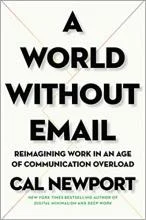
Book description (via Amazon): “We have become so used to an inbox-driven workday that it’s hard to imagine alternatives. But they do exist. Drawing on years of investigative reporting, author and computer science professor Cal Newport makes the case that our current approach to work is broken, then lays out a series of principles and concrete instructions for fixing it. In A World without Email, he argues for a workplace in which clear processes – not haphazard messaging – define how tasks are identified, assigned, and reviewed. Each person works on fewer things (but does them better), and aggressive investment in support reduces the ever-increasing burden of administrative tasks. Above all else, important communication is streamlined, and inboxes and chat channels are no longer central to how work unfolds.”
Why you should read it: Newport offers a brief history of electronic mail and how it has impacted productivity over time. He uncovers the hidden costs of what he calls the “hyperactive hive mind” at work and offers a number of approaches to breaking free from the tyranny of the inbox to lead more productive work lives and workforces. As Newport declares, it’s not a question of whether a world without email is coming, but whether you’ll be ahead of the trend or behind it.
Girl Decoded: A Scientist’s Quest to Reclaim Our Humanity by Bringing Emotional Intelligence to Technology
By Rana el Kaliouby with Carol Coleman
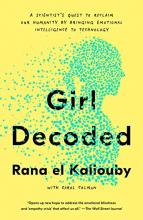
Book description: “Rana el Kaliouby is a rarity in both the tech world and her native Middle East: a Muslim woman in charge in a field that is still overwhelmingly white and male. Growing up in Egypt and Kuwait, el Kaliouby was raised by a strict father who valued tradition – yet also had high expectations for his daughters – and a mother who was one of the first female computer programmers in the Middle East. Even before el Kaliouby broke ground as a scientist, she broke the rules of what it meant to be an obedient daughter and, later, an obedient wife to pursue her own daring dream… In a captivating memoir, an Egyptian American visionary and scientist provides an intimate view of her personal transformation as she follows her calling – to humanize our technology and how we connect with one another.”
Why you should read it: Put this book on your nightstand, but don’t expect it to stay there long. This book does double duty as inspiration and instigation. You can enjoy this book as the memoir of a woman who made her way to the top of a field dominated by men, earning her Ph.D. and ultimately moving to America as a divorced mother of two where she co-founded Affectiva, the pioneering startup in the nascent field of Emotion AI. You can also dig into el Kaliouby’s argument: that you must “humanize technology before it dehumanizes us” and think more deeply about the application of advanced intelligent systems in your own organization and life.
Eat, Sleep, Innovate: How to Make Creativity an Everyday Habit Inside Your Organization
By Scott D. Anthony, Paul Cobban, Natalie Painchaud, and Andy Parker
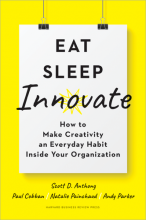
Book description (via HBR.org): "From the author of The Little Black Book of Innovation, a new guide for using the power of habit to build a culture of innovation. Leaders have experimented with open innovation programs, corporate accelerators, venture capital arms, skunkworks, and innovation contests. They’ve trekked to Silicon Valley, Shenzhen, and Tel Aviv to learn from today’s hottest, most successful tech companies. Yet most would admit they’ve failed to create truly innovative cultures. There’s a better way. And it all starts with the power of habit.
In Eat, Sleep, Innovate, innovation expert Scott Anthony and his impressive team of coauthors use groundbreaking research in behavioral science to provide a first-of-its-kind playbook for empowering individuals and teams to be their most curious and creative–every single day."
Why you should read it: Anthony and his team at consultancy Innosight detail a collection of behavior enablers, artifacts, and nudges – BEANs, they call them – that successful leaders harness to instill innovation throughout their organizations. In addition to the instructive nature of these stories of “normal organizations doing extraordinary things,” the authors offer tools to help IT leaders uncover their own hacks and habits for building and sustaining an innovative culture.
[ Get exercises and approaches that make disparate teams stronger. Read the digital transformation ebook: Transformation Takes Practice. ]



